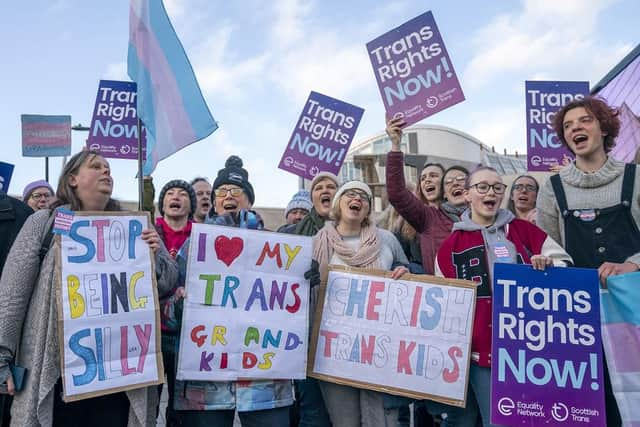Gender Recognition Reform Bill: UK Government accused of 'shifty, tight-lipped' secrecy as it refuses to release gender discussions
This article contains affiliate links. We may earn a small commission on items purchased through this article, but that does not affect our editorial judgement.
The comments come after the UK Government claimed it was not in the public interest to release correspondence it held relating to the Gender Recognition Reform Bill.
This was restricted to discussions ministers in Westminster had with Scottish Government counterparts, MSPs or Scottish MPs such as SNP representatives or Scottish Conservatives.
Advertisement
Hide AdAdvertisement
Hide AdHowever, the UK Government claimed releasing the information would “weaken ministers’ ability to discuss controversial and sensitive topics free from premature public scrutiny”.
They added “equality hub ministers are still working alongside ministers from other departments on the UK Government’s response to the Scottish Gender Recognition Reform Bill”, making release of the information inappropriate.
The failure to release the information follows the UK Government’s decision to block the legislation using, for the first time in the history of devolution, section 35 of the Scotland Act.
This unilaterally blocks the Bill from receiving royal assent due to the potential impact of the legislation on UK-wide equality law, with Alister Jack, the Scottish secretary, pointing at impacts on schools and other cross-border issues to justify its use.
Nicola Sturgeon has said it is an “inevitability” the use of section 35 will end up in court, most likely via judicial review. However, there is no timeline on when that will happen, nor have the government made a final decision about the next steps.


SNP MSP for the Highlands and Islands, Emma Roddick, attacked the secrecy from the UK Government and accused them of having “no justification or answers” and of using section 35 solely on the back of political, not legal, motivations.
She said: “It is unsurprising to see more evidence of Tory secrecy – it is becoming clear that Sunak is running a shifty, tight-lipped government which favours obstruction over transparency.
"Ultimately, we know that – aside from the one occasion the UK Government replied to the Scottish Government – Westminster did not try to communicate with the Scottish Parliament, MSPs, the Holyrood committee or Scottish Government about their supposed concerns.
Advertisement
Hide AdAdvertisement
Hide Ad"The only conclusion that can be drawn from their refusal to discuss or explain this shocking affront to Scottish democracy is that they have no justification or answers, and this decision was purely politically motivated.
"The contempt they are showing Scotland is beyond words and demonstrates that Scotland will always be vulnerable under Westminster control, and independence is the only way to escape the Tories and Westminster control for good."
A UK Government spokesperson said the decision to block the Bill was made after “thorough and careful consideration”.
They said: “The Secretary of State for Scotland has made an order under section 35 of the Scotland Act 1998, preventing the Scottish Parliament’s Gender Recognition Reform (Scotland) Bill from proceeding to Royal Assent.
“This was done after thorough and careful consideration of all the relevant advice and the policy implications. This legislation would have an adverse impact on the operation of Great Britain-wide equalities legislation.
“These adverse impacts have been set out in our statement of reasons. It is now for the Scottish Government to decide how to proceed.”
Want to hear more from The Scotsman's politics team? Check out the latest episode of our political podcast, The Steamie.
It's available wherever you get your podcasts, including Apple Podcasts and Spotify.
Comments
Want to join the conversation? Please or to comment on this article.
